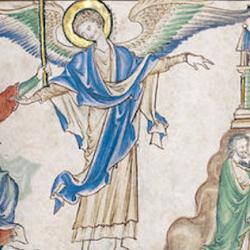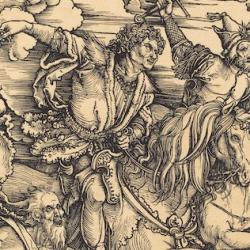Who is the angel in Revelation 22:6, 16?
Both of the verses echo the opening verse of Revelation, especially 22:6. The opening verse says that Jesus send and signified by His angel to His slave John, and earlier used the verb “show.” 22:6 states that the Lord sent His angel to show His slaves things that will take place shortly. The two verses share the verb “sent,” the fact that the angel is the agent or the one sent, the recipients of the message characterized as slaves, and the verb “show.” 22:16 doesn’t have the same overlap with 1:1, but it does share the verb “send” and the word angel with a possessive pronoun (here, “my”).
In a previous post, I argued that the “angel” in 1:1 is the Spirit, the “Angel” of Jesus. Does the word have the same reference in 22:6, 16? or does the word refer to Jesus, or to John? In the end, the effect is the same; on any interpretation, the revelation gets communicated to the slaves by Jesus/Spirit/John, since John doesn’t work independently of the Spirit nor the Spirit independently of Jesus. But the question is, what is the specific reference of “angel” in 22:6, 16?
The case for seeing the angel as Spirit in 22:16 is stronger. The angel is explicitly Jesus’ angel, and Jesus addresses John as the recipient of the angel’s testimony, which is then given on to the churches. According to John 15:26, the Spirit testifies of Jesus; and according to Revelation 19:10, the Spirit of prophecy is the testimony of Jesus. Thus, the Spirit’s work can be described in terms of martur -. Thus, it’s plausible to take the “angel” of 22:16 as the Spirit. 22:16 reminds John that he has received testimony “in the Spirit” to give to the churches. (We can also note the links between Revelation 22:16 and the promise of the leading angel in Exodus 23:20; 33:2, picked up in the promise of the sending of a “messenger” in Malachi 3:1. Jesus is Yahweh sending His Angel-Spirit ahead of His slaves to prepare their way into the promised land. “In the Spirit,” John is an agent of the Spirit-Angel preparing Jesus’ liberated slaves to pass through the tribulation that is coming and to enter into the new creation.)
That argument does not work as well for 22:6. The sender is not Jesus but “the Lord, the God,” and He is identified as the “God of the spirits of the prophets.” That is not identical to “God of the Spirit” but the link of spirit and prophet suggests that “spirits” is a reference to the Holy Spirit. It would be odd for God to be identified as the God of the human spirits of prophets, and besides the Spirit is conceived of as plural earlier in the book (the seven Spirits). This weakens the possibility that the angel mentioned in the following clause might also refer to the Spirit. If the Spirit is already mentioned as the “Spirits of the prophets,” it would be redundant to say that God sent His Spirit to show things.
The order of revelation in 22:6 is:
God as Sender —> His angel —> show His slaves
This closely matches the order of 1:1:
God — > gives Jesus —> to show slaves
When we compare the two passages, it seems that Jesus Himself is the angel who reveals to the slaves. That might help to make sense of the transition from 22:6 to 22:7, where Jesus is clearly speaking. But the rest of 1:1 complicates the order:
Jesus sends —> signified by His Angel-Spirit —> John
When we add that, and link together 1:1 and 22:6, we have the possibility that the “His angel” of 22:6 is either the Spirit or John. Since the “spirits of the prophets” are mentioned already in the verse, it seems more likely that John is here being identified as the “angel” who shows the slaves what will shortly take place. This, after all, is his prophetic commission: He is taken up by the Spirit, gripped by the seven Spirits of prophecy, so that he can be shown what must shortly take place (4:1; cf. 1:19). Thus, it seems most likely to me that 22:6 uses “angel” to refer not to Jesus, or the Spirit, or a spirit-angel, but to John.
That makes for a neat progression for John in the book. He describes himself at the outset as a “slave” and fellow-sufferer with the other slaves, but after he has been shown in the Spirit things that must take place, he is elevated to “angelic” status, and when he bows to an angel, he is called a “fellow servant” with the angel (22:8-9; cf. 19:10). Because his Master has shown him what He is about to do, John is no longer a slave but an angelic son.














